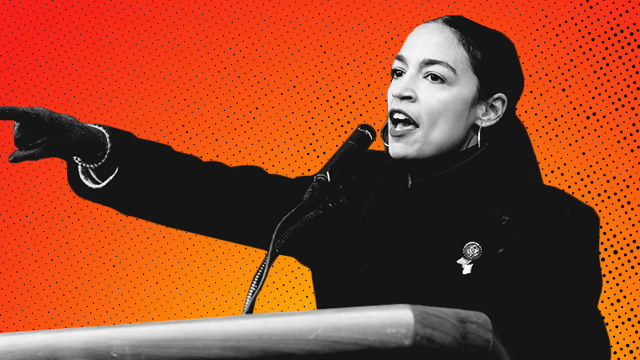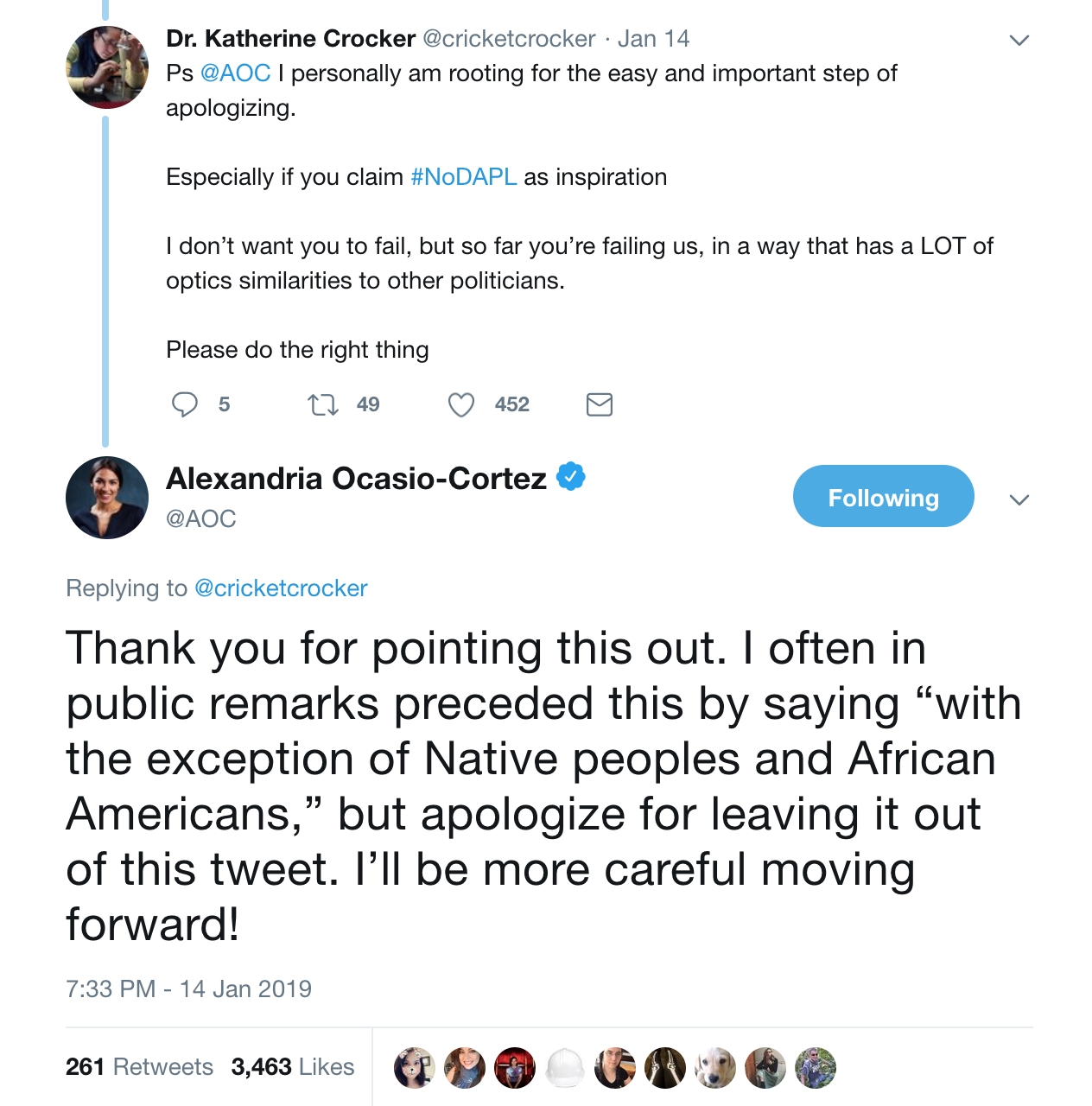
Only weeks into her first term in Congress, Alexandria Ocasio-Cortez has been attacked by many of the biggest grandstanders, opportunists, and trolls in American politics. A video of her dancing in college was used as a cudgel against her. As were her sharp pantsuits. And her childhood zip code. Once in office, her pro-ecology, pro-taxation-of-the-wealthy platform — which, it’s crucial to note, is generally favored by the majority of the nation — was grossly misconstrued by Fox News (which the New Yorker this week painted as a propaganda outlet posing as a new organization). After she celebrated the collapse of the Amazon HQ2 deal in Long Island City, the Job Creators Network hastily slapped up a billboard in Times Square to mock her (they added two more billboards this week).
The message from anyone opposed to her progressive platform seemed to be, “Shut up or feel our wrath.” But Ocasio-Cortez doesn’t play that. She’s a digital native who refuses to be silenced by the old guard. On days she’s not being interviewed, she’s swatting down those who come after her on Twitter. Both left and right-leaning media have helped make her one of the most famous politicians in the country, and she’s accepted that mantle with all it implies.
That’s not to say there haven’t been stumbling blocks. AOC — as she’s widely called — can play fast and loose with the facts. The Washington Post gave her four Pinocchios over a tweet about Pentagon spending. She can also sound troublingly unrepentant when she does make mistakes. After being asked about the Pentagon tweet by Anderson Cooper, she shrugged the error off, saying, “I think that there’s a lot of people more concerned about being precisely, factually, and semantically correct than about being morally right.” That seems reasonable if you agree with the Congresswoman’s idea of moral rightness, but that value is rarely absolute and, as such, it can be massaged by whoever wants to employ it for whatever means they desire. In other words, it’s a slippery slope.
Still, even her ideological enemies have to concede that Ocasio-Cortez has committed to sparking debate rather than simply fitting in. She’s quickly helped advance massive conversations about what it means to be a young American (and a woman! and a person of color!) in 2019 while demanding answers about where we’re headed as a nation. The conversations she’s focused on — from the effects of institutionalized racism to the viability of our very planet — are not easily navigable. But they’re the conversations young people like her want to have.
People of AOC’s generation, across the political spectrum, have been told since birth that they will inherit the world. Now that the process has begun, treating a politician who is focused on equality, the environment, and income disparity as “radical” is absurd.
A huge part of my agenda is to move the Overton window, because it’s a strategic position. I’m a first-term freshman in an institution that works by seniority. Procedurally, it is kind of like high school. You’re the new kid on the block. So, as a freshman, you have to look at the tools available to you, and in my first term, if we have the opportunity to frame the debate, then that is one of the ways to have the most power.
This quote, given to Rolling Stone, reveals a crucial piece of the Ocasio-Cortez agenda (it’s something her fellow Democratic Socialist Bernie Sanders modeled in 2016). The Overton window is the range of what’s deemed “acceptable” in public discourse and by talking about ideas like a seismic shift in how we approach climate change, the need for a sharp increase of the marginal tax rate, and intersectional women’s issues, she’s thrusting those conversations (which are already being had by young people online) into the mainstream.
AOC seems to revel in her position as a rabble-rouser. At the press conference where she unveiled the Green New Deal, she said, “Climate change and our environmental challenges are one of the biggest existential threats to our way of life, not just as a nation, but as a world. In order for us to combat that threat, we must be as ambitious and innovative as possible.” Is that polarized? Is it based in party politics? Isn’t it sort of… scientifically necessitated? Of course, that hasn’t stopped the plan from being shredded for a lack of specifics (nor should it). But Ocasio-Cortez’s response has been that the Green New Deal is just the beginning of a conversation that has been moving slowly and needs to ramp up dramatically. Not a final blueprint but a declaration of intent (for which she has strong bi-partisan support across the country).
Thinking of Ocasio-Cortez’s potential to shift the national conversation on progressive issues that matter to young people helps reconcile the fact that she won’t be right on all things. This is her first term and she’s allowed time to learn the ropes. Few congresspeople have been given such a massive platform and high degree of scrutiny so quickly (she admits that defending herself feels like “an extra job“). But this doesn’t mean that some complaints about her aren’t without merit. She was flippant in response to the NY Post’s Green New Deal-hypocrisy story on her overuse of Uber and flights when subways and light-rail were available, tweeting, “Living in the world as it is isn’t an argument against working towards a better future.” On one hand, The NY Post (which is owned by Rupert Murdoch, who also owns Fox News) obviously has an agenda that puts AOC in their crosshairs, but it’s fair of them to publish their findings and also fair of people to want new, young, bold leaders with sweeping agendas to model superb behavior.
Still, Ocasio-Cortez generally seems interested in listening to people and willing to revise her thought processes, a quality that any young person on Twitter has had to learn and one that’s all too rare in the Roger Stone “deny everything” era. She proved this when Indigenous Americans pointed out that her rhetoric about America as a “nation of immigrants” could be interpreted as a slight.

This isn’t about Alexandria Ocasio-Cortez. Or it’s not exclusively about her. It’s about a massive voting block in 2020, millennials, showing consistent intellectual bravery and the desire to have overarching, difficult conversations about our future. Where does human compassion intersect with how we build immigration policy? What do the mega-rich owe the societies that made them so wealthy? How long can we stall on taking action on climate change? What level of visibility should we demand of our leaders? Where do we — a country that self-identifies as more divided than ever — need to compromise? Where should we stand our ground and take hard lines?
Ocasio-Cortez has to navigate these questions on a tremendous scale (with backlash already brewing), but anyone longing for progress on issues of justice — related to climate, income inequality, race, and gender — needs to be willing to wrestle with them on the daily. Like a freshman congressperson, we won’t always be right. Some of these conversations are virtually brand new (think of how recently “intersectionality” entered the mainstream). We’ll stumble and have to revise our thinking. Perhaps we’ll sometimes be flippant when we feel attacked. But we need to keep coming back to the table. Our world demands that we face tough issues.
The desire to bring future-defining conversations to the fore isn’t radical. It’s not extreme. For Ocasio-Cortez’s and people of her generation, it’s necessitated by the world we live in.
